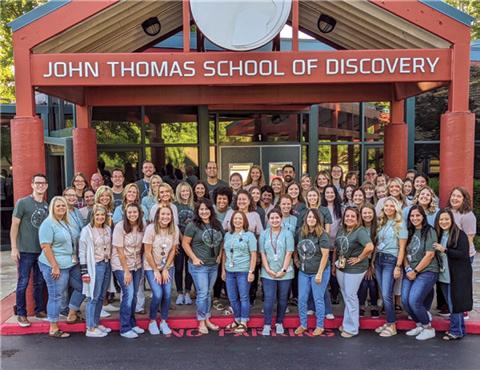
2 minute read
Why I Love PLCs Perfecting the Practice
BY JENNIFER BURRIS
“How do you support rst-year teachers?” When asked this recently, I was quite surprised that an applicant with no teaching experience would know the signi cance of this question. At the conclusion of the interview, I found myself thinking about what my response would have been prior to PLCs.
I can vividly remember when I accepted my rst teaching position. I was given a key to my classroom, a teacher’s edition of the textbook, class rosters, and a genuine “Good luck!” My classroom was right across the hall from a teacher who was teaching the exact same thing. What is now mind-blowing to me is that the two of us worked in complete isolation for the entire school year. Why? at’s the way it was always done.
It was common for schools to have a culture of complacency. Complacency is de ned as self-satisfaction, especially when accompanied by unawareness of actual deciencies. We didn’t know better! I have heard many times throughout my career “You don’t know what you don’t know.” e PLCs at Work Summit launched our PLC journey. e biggest takeaway was the four critical questions of a PLC, which transformed our educational practices as we had known them.
Twelve years later, one event wouldnally reveal there was indeed a better way.
What do we want students to learn? Before the PLC process was implemented, it was common practice for teachers to operate under the assumption that all standards are equally important and therefore attempt to cover each one for the same amount of time, not realizing that this inch-deepand-mile-long approach results in students with signi cant gaps who are not prepared for what’s next. After the PLC process was implemented, it became common practice for teams to collaborate during common planning time to identify high-priority standards. Once this has been done, teams move forward with building high-quality assessments that have a strong emphasis on these essential standards.
How will we know if they learned it? Before the PLC process, it was common practice for teachers to teach an entire unit before assessing to see if the students actually grasped the concepts. After the unit test, they moved on to the next unit. is approach left so many kids behind with no system to catch them up. With the PLC process, our teams now create common formative assessments (CFAs) that prioritize the essential standards and administer those CFAs throughout the unit. ey use these assessments to identify struggling students and provide support before they get to the unit test and it’s too late.
What will we do if they don’t learn it? Before the PLC process, it was common practice for teachers just to move on. After all, there is a pacing guide and teachers don’t have time to go back and reteach an entire unit. With the PLC process, teams now use the CFA data throughout the unit to determine which students need help with which standards and then provide immediate, targeted support during time that is built into the instructional day. After students receive additional support, often from a teacher other than their own, they have a chance to retest. What a growth mindset!
What will we do if they have learned it? Before the PLC process, the response would be the same as when they don’t learn it: give them a grade and move on to the next lesson. is approach doesn’t give pro cient students an opportunity to take their learning to a higher level. With the PLC process, teams now create rigorous extension lessons to stretch students’ learning while those who are struggling are provided additional support.
So, how do we support rst-year teachers? Before we were a PLC, I would have had very little to share with a brand-new teacher posing this question. Now that we’ve become a PLC, I can’t hold back my enthusiasm as I respond. e answer is quite simple. We give them the most valuable resource—each other! We plug them into our high-functioning PLC that fosters a culture of collaboration and promotes success as we work to ensure high levels of learning for all. at’s why I love PLCs!






